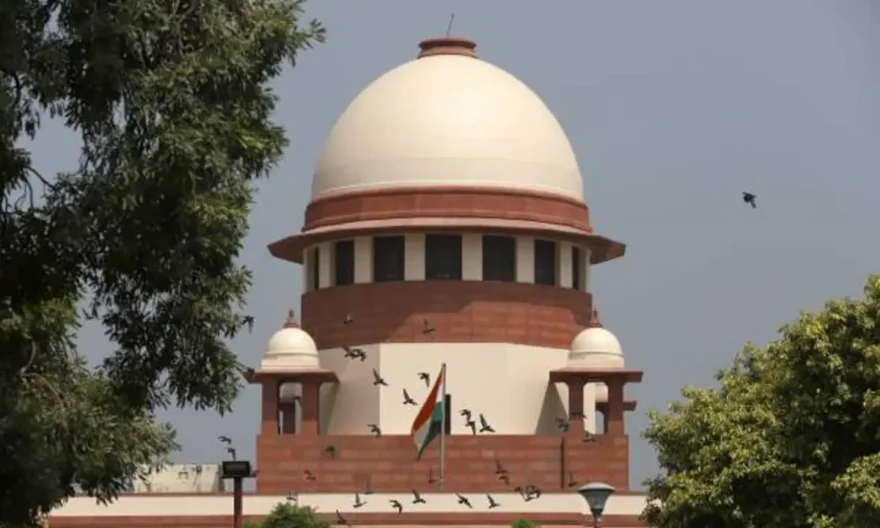
The Supreme Court on Wednesday ordered that a joint compilation of submissions should be filed by both parties in the Delhi government’s petition challenging the central government’s law establishing the pre-eminence of the lieutenant governor over the elected AAP administration in managing services in the national capital.
A bench of Chief Justice D Y Chandrachud and Justices J B Pardiwala and Manoj Misra heard senior advocate Abhishek Singhvi, representing the Delhi government, urging for the matter to be listed before a five-judge Constitution bench for an urgent hearing.
“I can’t express the agony of the (Delhi) administration,” the senior lawyer expressed.
The Chief Justice then stated, “There are older Constitution bench matters. We are listing those, and there are also two seven-judge bench matters pending for years, all of which are important. It may be listed after some time.”
However, the bench directed Singhvi and Additional Solicitor General Sanjay Jain to collaborate and determine the legal questions to be decided by the Constitution bench in the services dispute.
“We will appoint Shadan Farasat as the nodal counsel. We will request the common compilation to be prepared. Prepare your submissions in four weeks, and then you can mention it (for listing),” the bench directed.
Previously, on August 25, the Supreme Court had allowed the Delhi government to amend its petition challenging the central government’s ordinance establishing the pre-eminence of the lieutenant governor over the elected administration in controlling services.
The amendment was required because the ordinance had been replaced by a law. The Court took note of Singhvi’s submissions that initially, the challenge was directed against the ordinance, which had now become a law after being approved by both Houses of Parliament and receiving presidential assent.
“The interim application seeks an amendment to the writ petition by which the NCT Ordinance was challenged. Now, it has been replaced by an Act (the Government of National Capital Territory of Delhi (Amendment) Bill 2023). We have heard the counsel. The solicitor general says they have no objection. The application for amendment is allowed. The counter-affidavit (reply of the Centre) if any, may be filed within four weeks,” the bench had stated.
Recently, Parliament passed the Government of National Capital Territory of Delhi (Amendment) Bill 2023, also known as the Delhi Services Bill, granting the lieutenant governor significant control over service matters. Following the president’s approval, the bill became law.
Prior to this, the Supreme Court had referred the Delhi government’s plea challenging the Centre’s May 19 ordinance, which removed control over services from the city administration and triggered a new power struggle between the two centers, to a five-judge constitution bench.
On May 19, the Centre had promulgated the Government of National Capital Territory of Delhi (Amendment) Ordinance, 2023, to create an authority for the transfer and posting of Group-A officers in Delhi.
The Aam Aadmi Party (AAP) government had described it as a “deception” in light of the Supreme Court’s verdict on service control. The matter is still pending in the Supreme Court.
Before the ordinance was promulgated, a five-judge constitution bench led by the Chief Justice, in a unanimous decision, had sought to resolve the eight-year-old dispute between the Centre and the Delhi government. This dispute had been triggered by a 2015 home ministry notification asserting control over services, with the bench determining that the National Capital Territory administration has a unique status under the Constitution.
Given the recurring conflicts between the AAP government and the lieutenant governor, the apex court had emphasized the importance of an elected government having control over bureaucrats, as the principle of collective responsibility would otherwise be compromised.
The new law has established a National Capital Civil Service Authority for the transfer, posting, and disciplinary proceedings against Group-A officers from the Delhi, Andaman and Nicobar, Lakshadweep, Daman and Diu, and Dadra and Nagar Haveli (Civil) Services (DANICS) cadre.
The chief minister is one of the three members of the Authority, with the other two being bureaucrats. Decisions by the Authority are to be made by a majority vote, and in case of a dispute, the matter will be referred to the LG, whose decision will be final. Before the May 11 Supreme Court verdict, the executive control of the transfer and posting of all Delhi government officers rested with the LG.




